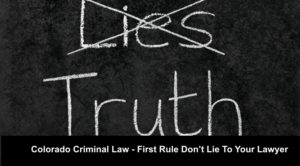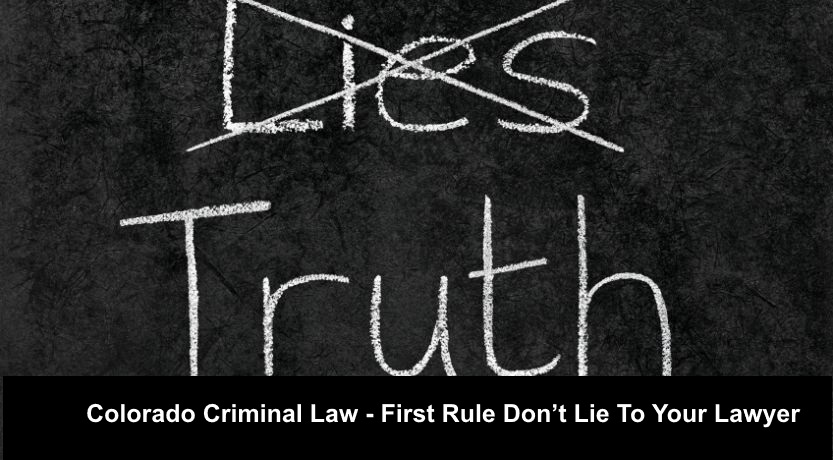




Colorado Criminal Law – First Rule Don’t Lie Or Omit The Facts To Your Lawyer
By H. Michael Steinberg Colorado Sex Crimes Criminal Defense Lawyer – Attorney
 Colorado Criminal Law – First Rule Don’t Lie Or Omit The Facts To Your Lawyer – Understanding the relationship between a criminal defense lawyer and their client can be complex and therefore difficult. In my opinion there is a lot of misinformation about the nature of that relationship and the pitfalls that can lead to a bad result in the case at hand. `
Colorado Criminal Law – First Rule Don’t Lie Or Omit The Facts To Your Lawyer – Understanding the relationship between a criminal defense lawyer and their client can be complex and therefore difficult. In my opinion there is a lot of misinformation about the nature of that relationship and the pitfalls that can lead to a bad result in the case at hand. `
The Facts – The Terrible Need For A Truthful Rendition Of The Facts
Building trust with your lawyer means understanding the key fundamental objectives of representation. A client must first know what decisions are their decisions and which decisions remain with the lawyer . A client that is well informed and knows all of their options is in the best place to make well informed choices.
Strategic decisions made by the criminal defense lawyer such as – how to investigate a case, formulation of the correct position to take during negotiations – and what evidence to present if the case goes to trial, are the exclusive province of the criminal defense lawyer. To make those decisions will depend upon counsel’s legal training and experience after a thorough analysis of the case facts and law.
The need for a complete and truthful account of all of the facts relating to the case is therefore critically necessary to investigate and prepare for an effective defense – and for that your lawyer needs a complete, accurate, and brutally honest picture of the facts.
A full and accurate account of the facts means knowing:
1. The accused’s whereabouts and behavior at the time of the crime.
2. All interactions with other persons involved in the case such as the alleged victims, potential co- defendants, potential eye, ear or knowing witnesses.
3. All interactions with the police and other law-enforcement personnel touching the case.
The Myth That You Should Only Tell Your Criminal Defense Lawyer The “Good” Facts
There are those, who, out of ignorance, may believe that their criminal defense lawyer only wants to hear are the good facts.
Nothing could be further from the truth.
The truth is this – criminal defense lawyers must know every “bad fact” that the District Attorney may use in the case. When the lawyer does not know these facts he or she is not prepared to directly challenge those facts during each critical stage of the case.
Without knowing all of the facts, good and bad, a criminal defense lawyer’s strategy may later fall apart. In fact, many people who have been charged with crimes are convicted precisely because they failed to disclose key – damaging evidence – to their lawyers.
Why Clients May Lie To Their Own Lawyer
Because most people have never been charged with a crime in their lives, that may lie or omit key facts from their defense lawyer for many reasons. Among those reasons are the fear of alienating the lawyer by revealing incriminating evidence about their involvement in the commission of the crime. Other reasons include an attempt to protect others involved in the case, and bad advice from persons in and out of the Colorado criminal justice system. Finally the client may believe that if his or her lawyer only has the “good” part of the facts – that is all they need to confront the prosecutor.
Your Criminal Defense Lawyer Is Not There To Judge You
All experienced criminal defense lawyers know that they must clearly communicate to their clients that they will never judge their client’s actions, – their duty is to aggressively represent the client whether he or she is guilty or innocent…. period. A United States criminal defense lawyer’s job is unique in the entire world – the lawyer’s only goal is the best possible result for their client in the case.
The Need For Trust – Balanced Against The Need For Brutal Honesty
Confrontation with a client builds distrust. On the other hand, when a lawyer interviews their client about the facts of the case they may be forced into a somewhat aggressive “cross – examination” of the client where there may be obvious lying. The discovery of the truth
While distrust from confrontational tactics by one’s own lawyer can irreparably damage an “attorney-client” relationship, the need for tough questions to be answered cannot be overstated at times.
Your Criminal Defense Lawyer May Cross-Examine You For Your Own Good And The Good Of The Case
As argued above, the client must be “made to tell” the complete truth to their lawyer. There is no middle ground. The client must be confronted with contradictions and inconsistencies in their version of what happened before those factual “weaknesses” and inconsistencies are exposed during negotiations, or later, if a trial is necessary.
The “case-planning” and “investigative stages” of a Colorado criminal case precede the plea bargaining and trial stages. During and after passing through these stages your criminal defense lawyer must have confidence in his or her understanding of the facts of the case and have complete confidence in their client’s truthfulness and domination over those facts.
Criminal Defense Lawyers Have Different Methods Of Interviewing Their Clients About the Facts Underlying The Charges
The sheer difficulty in cross-examining one’s own client vigorously also cannot be understated. Your criminal defense lawyer does not want to alienate you and will work hard to maintain trust while engaging in exercises such as “role-playing” the manner and method of the client’s cross examination in court.
This “dry run” can be an unsettling experience for the client, but it drives home the need for the client to be well prepared should he or she take the stand at trial.
Multiple interviews of the client and possible defense witnesses may be necessary. Facts are continually discovered which were missed in earlier interviews, and these “new facts” must analyzed by the lawyer.
Many Experienced Criminal Defense Lawyers Use A Three Phase Approach To Thoroughly Interview Their Client
While many criminal defense lawyers use different approaches to interviewing their clients – I try to employ a three phrase approach.
Phase One Interviewing – The Use Of Open Ended Questions
The first interview may actually take place in a free phone consultation. It amounts to a guided but free flowing open ended rendition of the story in the words of the person telling it with few directed questions. The intent is to put the person telling the story at ease with little feed back from the lawyer.
This approach helps the lawyer determine much about the way the case is impacting the client and how the client “conceptualizes” their case. It brings home the client’s concerns, attitudes, intelligence and verbal ability.
Phase 2 Interviewing – Going Over The Facts – Directed Questions
During this phase, the lawyer will go over the story again, fleshing out legally significant facts and asking the client to remember and recount everything about the case in much greater detail.
A way to view this phase is that it should follow a literal “time line” of the events which is then broken down into ” blocks” with specific boundaries that are legally significant in terms of the crimes charged. The time line may follow the classic “who, what, why, when, where, and how” approach.
Phase 3 – Interviewing – Filling In The Important Details
The final round of the interviews fills in any additional details and explanations. Here the lawyer may request the client to fully explain anything that is still open to ambiguity to counsel. Any final omissions of fact or inconsistences of fact must be clarified.
Here I will actually put myself in the shoes of my client and try to experience what my client might have seen, heard, and felt – imagining the natural sequence and consequences of the facts and evidence in the case.
The Bottom Line – A Truthful Analysis Of The Case Based On A Comprehensive Understanding Of The Facts
The criminal defense lawyer’s job is to objectively analyze the strengths and weaknesses in any criminal case. After that process is completed, the job is to manage a client’s expectations and to reach the very best result for that client and his or her case. This process can take a great deal of time – but it is fully necessary and must be done methodically and thoroughly.
Colorado Criminal Law – First Rule Don’t Lie Or Omit The Facts To Your Lawyer
The Steinberg Colorado Criminal Defense Law Firm – The Right Response at the Right Time
If you or someone you know has been has been arrested or charged with a crime in the Denver Metro area, please call H. Michael Steinberg. H. Michael is one of the most experienced criminal defense lawyers in Colorado and he will aggressively seek the best possible result in your Colorado criminal case.

The Steinberg Colorado Criminal Defense Law Firm invites you to contact us immediately. To reach us now – and obtain a free phone consultation, please feel free to complete and submit the form on this page (it goes directly to H. Michael’s cell phone) or call him at his Denver Tech Center home office at 303.627.7777. Under urgent circumstances, please call his cell phone directly at 720.220.2277.

Other Articles of Interest:
- Colorado Criminal Sex Crimes Law – FAQ – Can A Colorado Sex Offender Transfer Probation to Another State Under the Colorado Lifetime Treatment of Sex Offenders Act?
- Understanding Colorado Sexual Exploitation Child Pornography Law – The Search Warrant
- Sentence Reconsideration – Under Colorado Rule of Criminal Procedure Rule 35(b)
- Understanding Colorado Plea Bargaining – When A Judge Rejects The Plea Agreement
- Can I Appeal My Sentence In Colorado? When And On What Grounds?












